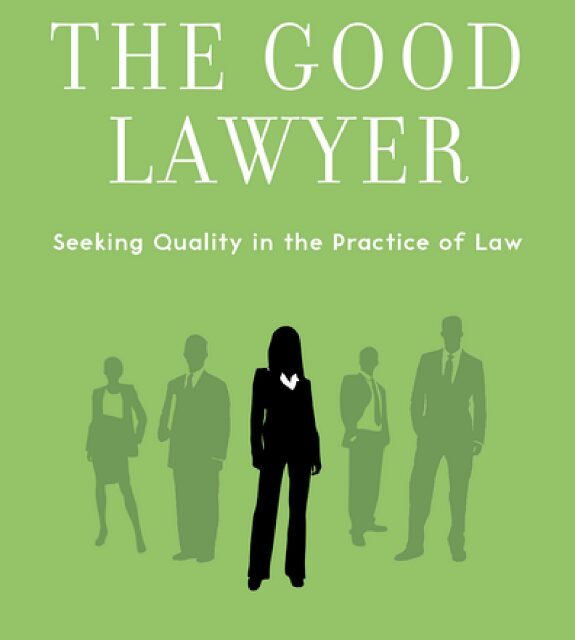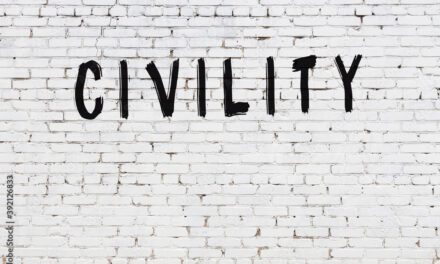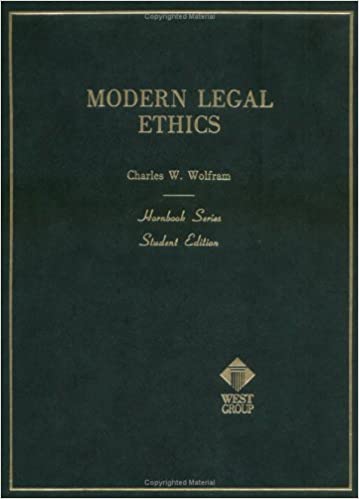Douglas O. Linder & Nancy Levit. THE GOOD LAWYER: Seeking Quality in the Practice of Law. Oxford University Press, 2014, with an
enormous bibliography to be found in the footnotes. My exposition, commentary, and critique will be presented in several parts. This one is on background and foundations. This is Part II; Part I should be read first. It pertained to foundations, topics, most-important sources. Other parts concern other specific matters and they will be organized by questions about commentaries on, and therefore, arguments with different chapters.
Empathy & Being Empathetic
The authors reject the proposition that empathy is having a feeling. Empathy is characterized, by the authors, as “the capacity to assess the internal life of another person. Empathy allows us to stand in someone else’s shoes, feel what the person is feeling, appreciate what he or she values, and responds appropriately.” It underpins the “human disposition to altruism and compassion” “Empathy can jar us out of thoughtlessness and indifference and focus our attention on the human consequences of our decisions.”
I personally like, “affectionate,” every word of these foundational theses. But don’t the authors make empathy a capacity to have
a feeling and then to have it, namely, that of the other fellow? Don’t they do this explicitly and by implication?
How am I standing in the shoes of another if I do not have feelings more-or-less identical to his, at least in substance? However, in order to be empathetic to a person whose teenage son, say at 15, just hanged himself for unknown and not-understood reasons, do I have to experience an emotion even close to his?
I understand grief in all sorts of ways, but must I have his grief, as it were?
Now for other questions:
- Is the authors’ idea of empathy, being empathetic, or even striving at an advanced level for having empathy characteristic of a good lawyer?
- It certainly is not a necessary condition of excellent or even good lawyering, true?
- Is correlated with greatness in lawyers? Would a lawyer who mainly represents large companies in business deals with other large companies have this characteristic? Is it even characteristic of them? Should those who don’t have it, who spend 100% of their time working on behalf of the interests of large corporations develop the virtue of being empathetic in order to serve their clients loyally, zealously, within the law, advising and counseling as to their best interests? Need they do this? Of course, one can have empathy for a less-than-human animal, e.g., one’s dog, for his/her pain, confinement, loss, etc., but isn’t having the same empathy restricted to living beings?
- What about judges and empathy? Isn’t it the case that the empathetic judge may have a susceptibility to bending the law in inappropriate ways and/or the facts? Sure, they must have some; otherwise, wouldn’t they be hard-hearted? This chapter ends with a list of 12-item checklists. Is it reasonable that they should all be devoted to situations in which human persons are the client? Is #7 on the list really an acceptable general principle? “Avoid legal jargon, lectures, and long-winded answers?” Granted “long-winded” should be avoided, but what about “lengthy?” Consider this: “When dealing with a large company seeking advice and counseling on complex, sophisticated transactions, make sure those being addressed understand what is said, actually need lengthy answers, might want outlines to be handed out but don’t want the answers to be longer than they need to be? But is this empathetic? Or is it something else, and if so, what?
- If one’s client is a large corporation, is empathy for the corporate folks required for being a good lawyer? If so, to whom does it run? Employees? Top employees? The officer at the top making ten times what the next person down makes? But also, the source of most good ideas had a significant charisma (the job type, the narcissistic man who thinks he is Steve)? What
about directors? Shareholders? Bondholders? For how many people in a group can anyone have empathy in a given situation? - I have done a lot of work for insurance companies as to coverage and when to settle large cases if they should be settled at all. Isn’t it a good idea for me to know the feelings and nature of the plaintiffs, the victims, and maybe their lawyers, in at least some cases? Might this not be more important than knowing the true feelings of the insurer and/or the insured?
- When bad faith in insurance adjusting is the central issue, it seems that I can exercise my obligations to my client, the
the insurer, only if I know something about the mind of the relevant adjusters. Maybe something about her or his feelings? Frequently I have had to know about their biases and last objectivity. To what extent do I have to understand their feelings? I certainly have to understand their mistakes, if any, and why they were committed. If the adjuster has fouled up and is frightened of dismissal–say because she is 50–don’t I still have a duty to my client to explain? What do I think happened, even if I condemn the adjuster to dismissal? Even if I love the adjuster deeply as a person? (Suppose she has been like a mother to me in teaching me the claims side of the insurance business?) If the adjuster was handicapped by having racial contempt, do I have to know about this? Do I have to have empathy for him or her? (Nota bene: I have not seen that explicitly, at the surface, in many years, but aren’t their other prejudices, e.g., the victim is too fat. Admittedly, in liability situations, that can be relevant, but it is much less likely to be when applied to the insured, the defendant. - Are there different dimensions, or components, of emphasis? Could one have empathy for a person contracting a disease,
but not a husband or wife having infidelity inflicted upon them? Empathy for a drug addict but less for an alcoholic, or one with a light case. - Are there degrees of empathy? Acute versus superficial? Intense versus mild? Deep versus shallow? And so forth?
If so, are there particular dimensions a good lawyer ought to have, do have, most have, that are correlated to some relative degree, at least, or must-have? Are there degrees of empathy, or being empathetic, which are required or are highly correlated with the goodness qua lawyer? Is it the case that dimensions and degrees of being empathetic can be mixed together, and if so what is the ideal mix for a good lawyer? Or the OK mix? Are these really questions that a book like this one should be treating? Maybe not. - Is empathy really about being a good lawyer or it is about being a moral person–a good person–and/or about being a good citizen–also, probably, a dimension of being a moral person?
- Can a cynical lawyer be empathetic? Upon what sorts or degrees would this depend?
- What about a truly skeptical lawyer?
I repeat I am completely sympathetic to the view and exhortation of the authors, at least when it comes to representing persons. I have found this to be so in personal injury cases, divorces, employment, and discrimination cases.
However, it is often their feelings that stand in the way of reasonable settlements that are in their best interests. A good lawyer
may sometimes have to have the discipline to tell them to “Get over it.”
At that time, I value the authors’ love of stories and storytelling; it was fun and deep to do and is satisfying to hear. As a long-time reader of novels (that I finish if they are not too boring and not too long), a watcher of movies (even films), and a passionate attendee of live theater, I love stories and I have since I was a child.
At the same time, I am an unbeliever. Even a well-told story with a terrific plot often leaves me in doubt as to the probability of its theme being considered as thesis, although not as to beautify when it comes to structuring and to language.
Indeed, much of the best literature creates unanswered questions that are sometimes unanswerable. Is this what stories to clients and stories to juries ought to look like?
I know from reading his stories that Linder’s mentor and one of his heroes is a great lawyer and maybe a good one. I love his position regarding the centrality of stories. They focus attention, to some degree. They grab to the heart, again, to some
degree. But Spence does not seem to recognize that ifs his telling the story that makes the difference, at least as the obtaining a high degree of focus and a great grab, and not necessarily the story itself. I’m not sure he has distinguished talent from the tool.
I have seen lawyers trying to follow or be Spencerian, and most of them are terrible at it. For the sake of justice, never, never, never try Spencerian argument in an appellate court or a trial court like most U.S. District Courts, if there is no jury at hand. Lawyers do not serve their clients when they tell stories in the “Pirsig Mode”–too long-winded, for one thing.
*************************************************************************
After Thought
September 16, 2014
The former Archbishop of Canterbury had an interesting set of lectures this year a while after he retired from his bishopric. It was about EMPATHY.
He expressed some skepticism about empathy being one of the central ideas regarding sound moral and ethical thinking. First of all, it diverts attention from ethical problems arising not from individual persons but from whole groups (ISIL–my example, not his). It does not focus on the victimization of whole groups and/or classes; not everyone will feel the same way about suppression, about the injustice of unjust wages (again, my example, not his). And he treats other matters as well.
This leads me to do some philosophical reflection on the idea. (1) I wonder if empathy always includes sympathy? (2) Does having empathy for suffering always lead to a duty to help? (2) Does having actual empathy always imply that the victim whose pain you feel has been treated unjustly? (3) Can hostility be founded on empathy under some circumstances. (“I see you experienced both joy and guilt as a result of cutting that child’s head off after you tortured her and abused her sexually. I feel your pain.” What now?) (Should prosecutors always feel empathy for the criminal? Never if guilty? Never is unremorseful? If filled with self-hatred which is well deserved?)
Now for a kind of political question involving empathy, maybe. (4) Assume ISIL volunteers believe that their national and ethnic groups have been unjustly treated. Assume further that they believe that executing westerners is a not-so-good but necessary way to get the attention of the west, e.g., the U.S. They are filled with hatred and rage, perfectly understandable, given their political views.
Should we have empathy with these guys, granting that they are very bad guys? Some have the attitude that the western response should include the following. Indicate what is coming. Demand the turn-over of the actual executioners. The demand of ISIL is that just POW rules be adopted forthwith and applied insofar as even possible to civilians. They will almost certainly not consent to this, and one still might feel their pain.
At that point, it seems to many that western forces, e.g., those of the U.S., could reasonably adopt a policy of ~POWs will be taken. Could this possibly be a just position, forgetting about whether it would be a sound military strategy? Would the obligation to have empathy for those who have been downtrodden permit this sort of decision?





Recent Comments